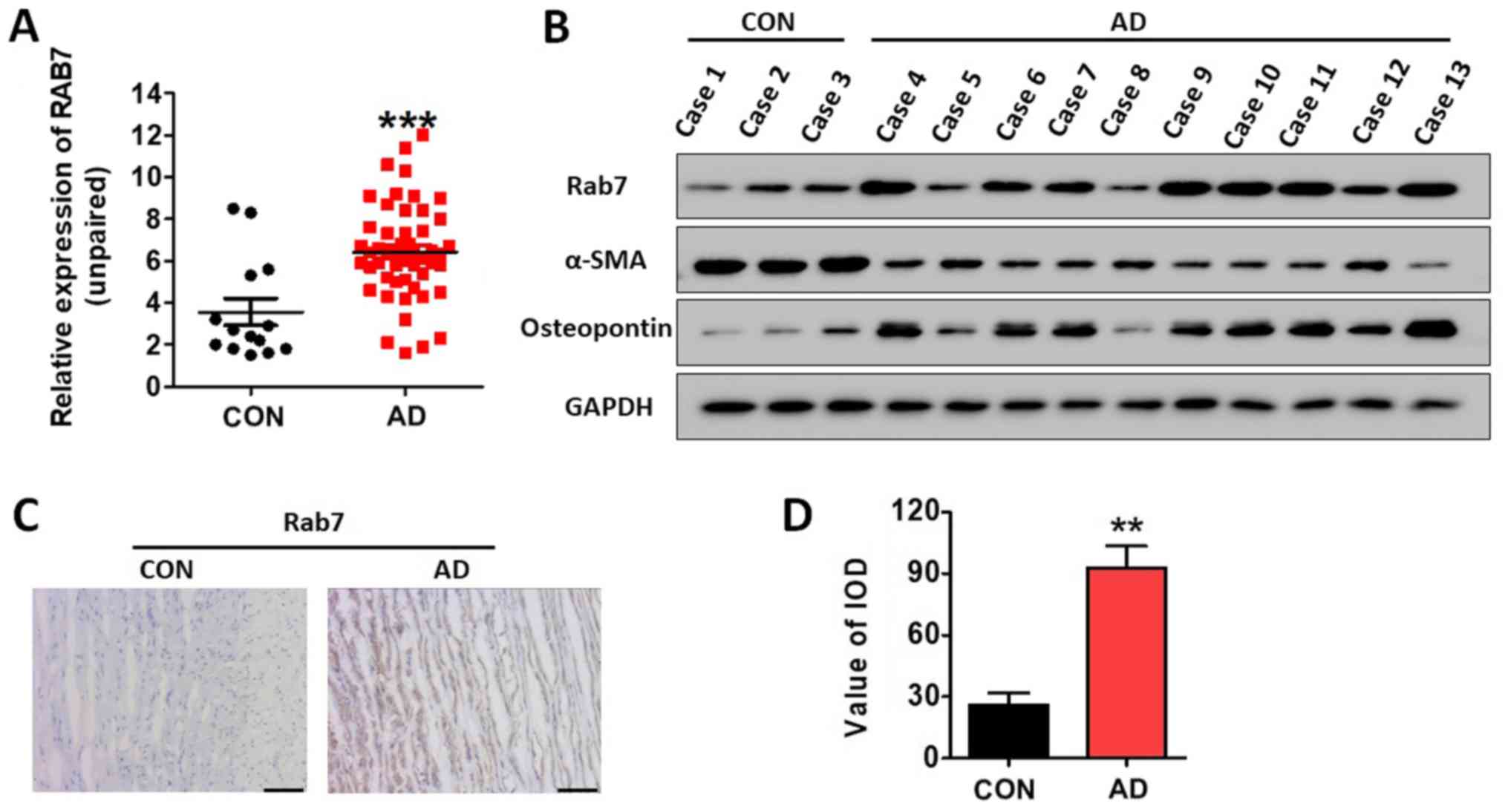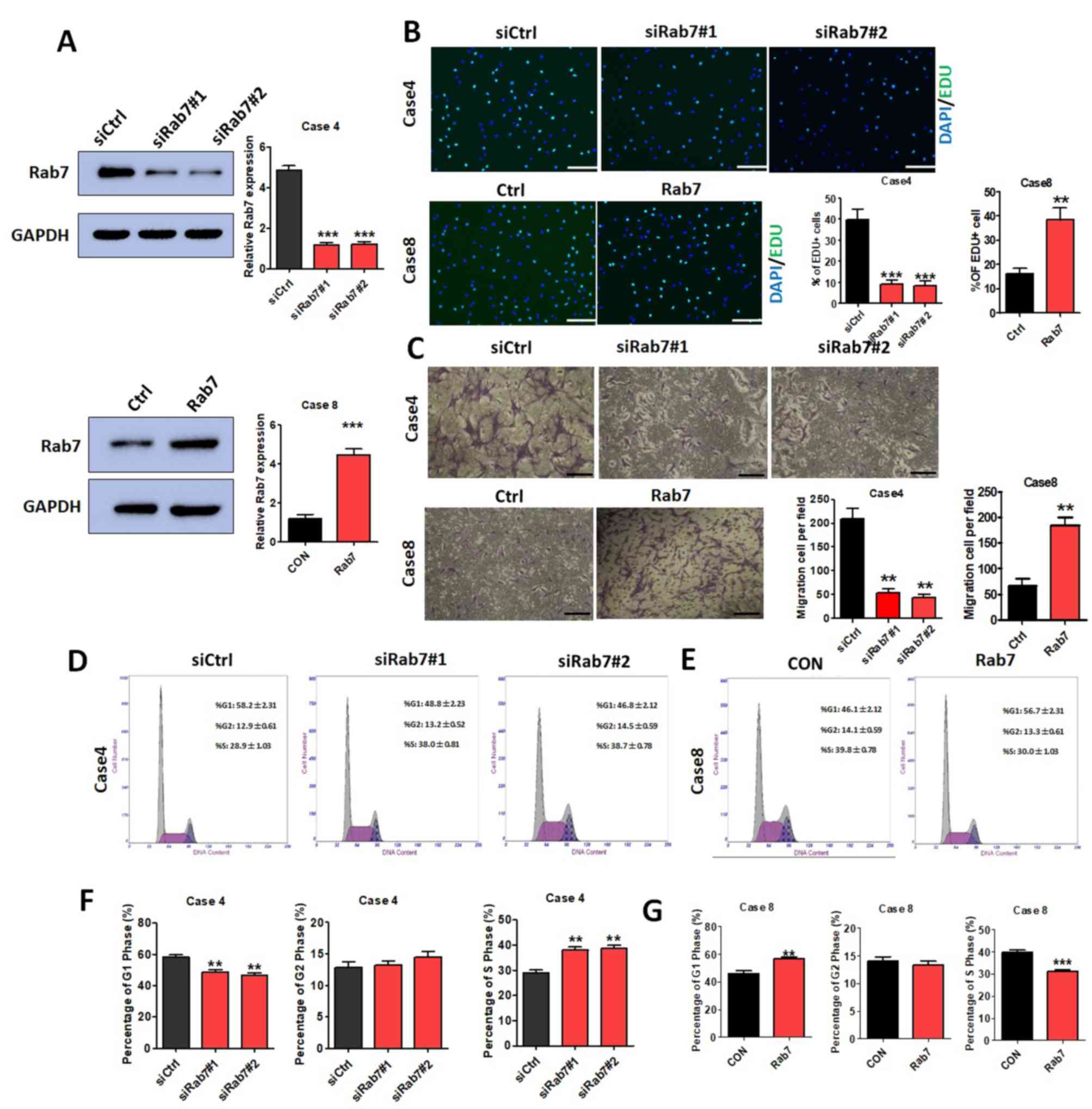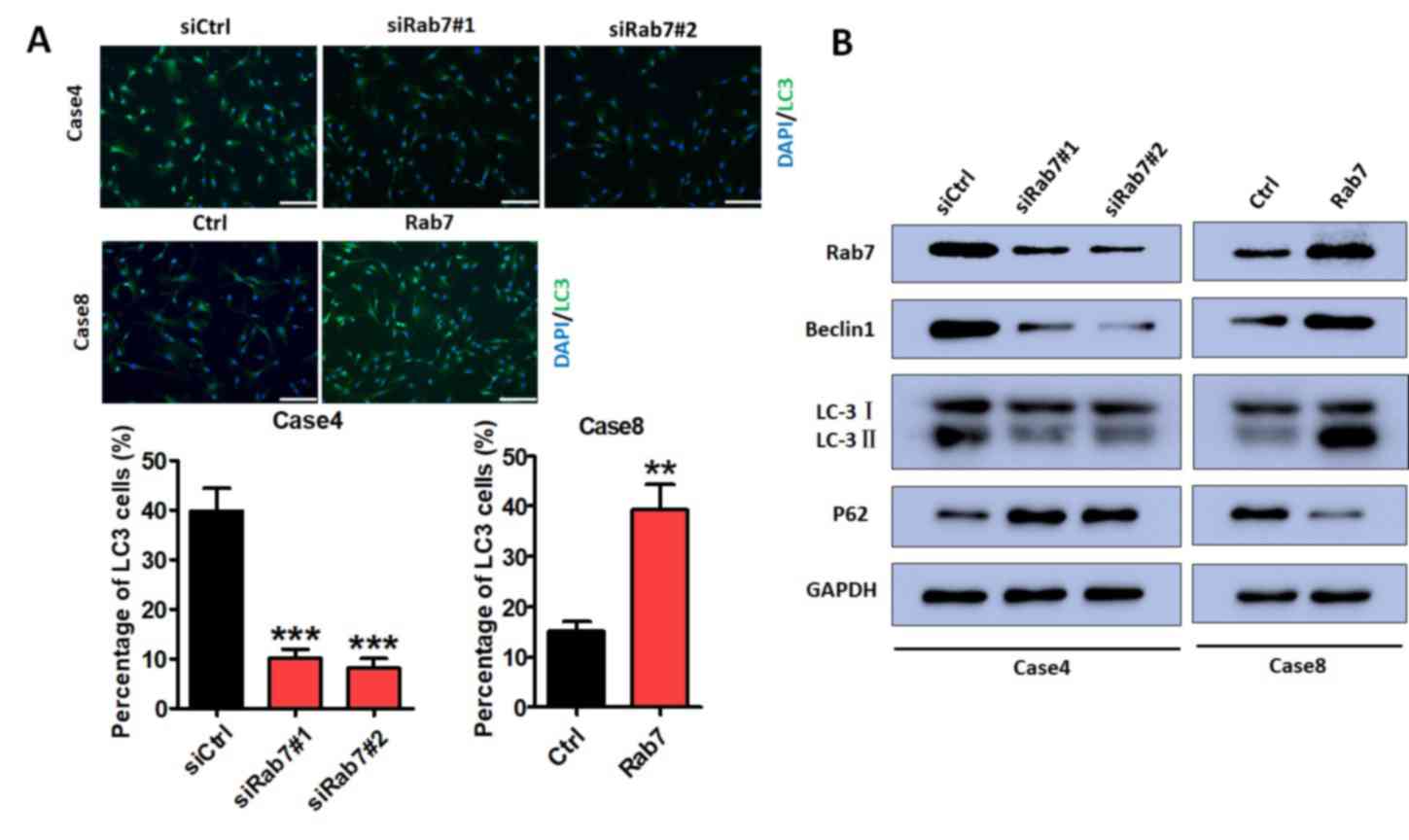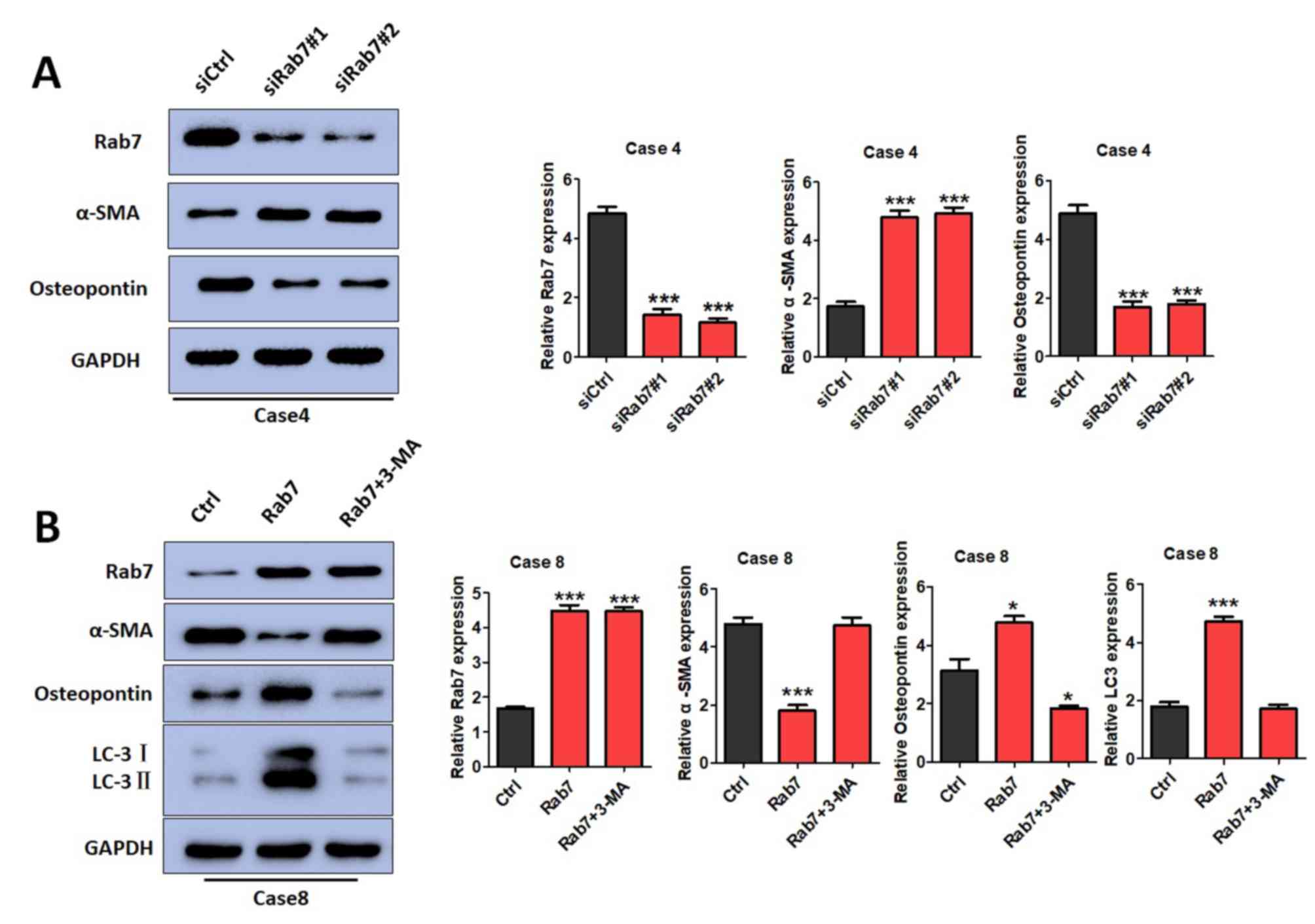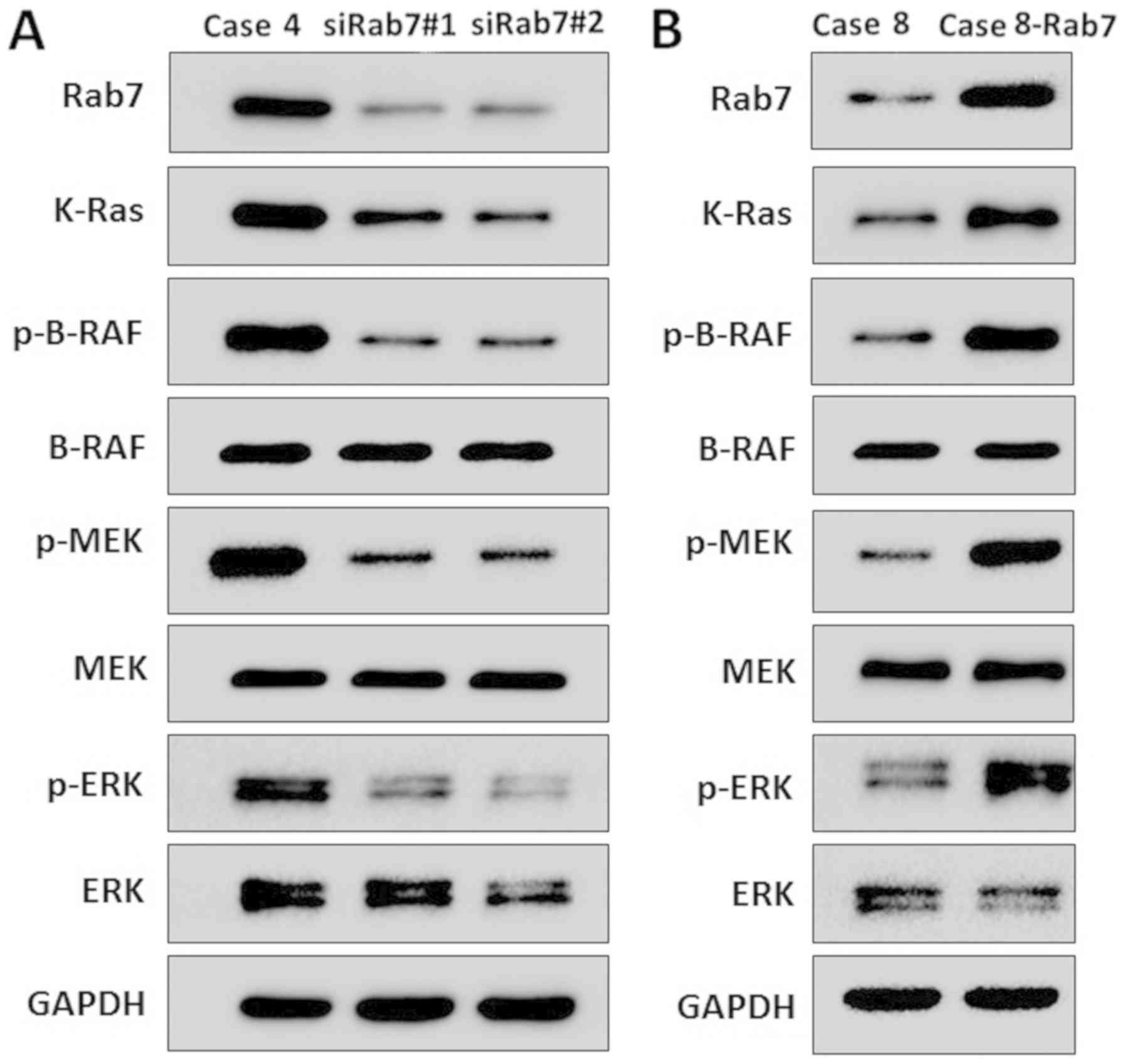|
1
|
Hecht E, Freise C, Websky KV, Nasser H,
Kretzschmar N, Stawowy P, Hocher B and Querfeld U: The matrix
metalloproteinases 2 and 9 initiate uraemic vascular
calcifications. Nephrol Dial Transplant. 31:789–797. 2016.
View Article : Google Scholar : PubMed/NCBI
|
|
2
|
Liu K, Fang C, Shen Y, Liu Z, Zhang M, Ma
B and Pang X: Hypoxia-inducible factor 1a induces phenotype switch
of human aortic vascular smooth muscle cell through PI3K/AKT/AEG-1
signaling. Oncotarget. 8:33343–33352. 2017.PubMed/NCBI
|
|
3
|
Zhong Y, Feng J, Li J and Fan Z: Curcumin
prevents lipopolysaccharide-induced matrix metalloproteinase-2
activity via the Ras/MEK1/2 signaling pathway in rat vascular
smooth muscle cells. Mol Med Rep. 16:4315–4319. 2017. View Article : Google Scholar : PubMed/NCBI
|
|
4
|
Freise C, Bobb V and Querfeld U: Collagen
XIV and a related recombinant fragment protect human vascular
smooth muscle cells from calcium-/phosphate-induced
osteochondrocytic transdifferentiation. Exp Cell Res. 358:242–252.
2017. View Article : Google Scholar : PubMed/NCBI
|
|
5
|
Owens GK, Kumar MS and Wamhoff BR:
Molecular regulation of vascular smooth muscle cell differentiation
in development and disease. Physiol Rev. 84:767–801. 2004.
View Article : Google Scholar : PubMed/NCBI
|
|
6
|
Hogarth DK, Sandbo N, Taurin S, Kolenko V,
Miano JM and Dulin NO: Dual role of PKA in phenotypic modulation of
vascular smooth muscle cells by extracellular ATP. Am J Physiol
Cell Physiol. 287:C449–C456. 2004. View Article : Google Scholar : PubMed/NCBI
|
|
7
|
Pei C, Qin S, Wang M and Zhang S:
Regulatory mechanism of human vascular smooth muscle cell
phenotypic transformation induced by NELIN. Mol Med Rep.
12:7310–7316. 2015. View Article : Google Scholar : PubMed/NCBI
|
|
8
|
Yan Y, Wang C, Lu Y, Gong H, Wu Z, Ma X,
Li H, Wang B and Zhang X: Mineralocorticoid receptor antagonism
protects the aorta from vascular smooth muscle cell proliferation
and collagen deposition in a rat model of adrenal
aldosterone-producing adenoma. J Physiol Biochem. 74:17–24. 2018.
View Article : Google Scholar : PubMed/NCBI
|
|
9
|
Lv P, Zhang F, Yin YJ, Wang YC, Gao M, Xie
XL, Zhao LL, Dong LH, Lin YL, Shu YN, et al: SM22α inhibits
lamellipodium formation and migration via Ras-Arp2/3 signaling in
synthetic VSMCs. Am J Physiol Cell Physiol. 311:C758–C767. 2016.
View Article : Google Scholar : PubMed/NCBI
|
|
10
|
Potier M, Gonzalez JC, Motiani RK,
Abdullaev IF, Bisaillon JM, Singer HA and Trebak M: Evidence for
STIM1- and Orai1-dependent store-operated calcium influx through
ICRAC in vascular smooth muscle cells: Role in proliferation and
migration. FASEB J. 23:2425–2437. 2009. View Article : Google Scholar : PubMed/NCBI
|
|
11
|
Guo RW, Yang LX, Li MQ, Pan XH, Liu B and
Deng YL: Stim1- and Orai1-mediated store-operated calcium entry is
critical for angiotensin II-induced vascular smooth muscle cell
proliferation. Cardiovasc Res. 93:360–370. 2012. View Article : Google Scholar : PubMed/NCBI
|
|
12
|
Meng YH, Tian C, Liu L, Wang L and Chang
Q: Elevated expression of connective tissue growth factor,
osteopontin and increased collagen content in human ascending
thoracic aortic aneurysms. Vascular. 22:20–27. 2014. View Article : Google Scholar : PubMed/NCBI
|
|
13
|
Wanjare M, Kusuma S and Gerecht S:
Defining differences among perivascular cells derived from human
pluripotent stem cells. Stem Cell Reports. 2:561–575. 2014.
View Article : Google Scholar : PubMed/NCBI
|
|
14
|
Pahk K, Joung C, Jung SM, Young Song H,
Yong Park J, Woo Byun J, Lee YS, Chul Paeng J, Kim C, Kim S and Kim
WK: Visualization of synthetic vascular smooth muscle cells in
atherosclerotic carotid rat arteries by F-18 FDG PET 7.
69892017.PubMed/NCBI
|
|
15
|
Mack CP: Signaling mechanisms that
regulate smooth muscle cell differentiation. Arterioscler Thromb
Vasc Biol. 31:1495–1505. 2011. View Article : Google Scholar : PubMed/NCBI
|
|
16
|
Pyle AL and Young PP: Atheromas feel the
pressure: Biomechanical stress and atherosclerosis. Am J Pathol.
177:4–9. 2010. View Article : Google Scholar : PubMed/NCBI
|
|
17
|
Ma J, Feng Y, Li Z and Tang C: The effect
of adrenomedullin and proadrenomedullin N-terminal 20 peptide on
angiotensin II induced vascular smooth muscle cell proliferation.
Iran J Basic Med Sci. 19:49–54. 2016.PubMed/NCBI
|
|
18
|
Chuang TD, Pearce WJ and Khorram O:
miR-29c induction contributes to downregulation of vascular
extracellular matrix proteins by glucocorticoids. Am J Physiol Cell
Physiol. 309:C117–C125. 2015. View Article : Google Scholar : PubMed/NCBI
|
|
19
|
Salabei JK, Cummins TD, Singh M, Jones SP,
Bhatnagar A and Hill BG: PDGF-mediated autophagy regulates vascular
smooth muscle cell phenotype and resistance to oxidative stress.
Biochem J. 451:375–388. 2013. View Article : Google Scholar : PubMed/NCBI
|
|
20
|
Mima J: Reconstitution of membrane
tethering mediated by Rab-family small GTPases. Biophys Rev.
10:543–549. 2018. View Article : Google Scholar : PubMed/NCBI
|
|
21
|
Distefano MB, Kjos I, Bakke O and Progida
C: Rab7b at the intersection of intracellular trafficking and cell
migration. Commun Integr Biol. 8:e10234922015. View Article : Google Scholar : PubMed/NCBI
|
|
22
|
Jimenez-Orgaz A, Kvainickas A, Nägele H,
Denner J, Eimer S, Dengjel J and Steinberg F: Control of RAB7
activity and localization through the retromer-TBC1D5 complex
enables RAB7-dependent mitophagy. EMBO J. 37:235–254. 2018.
View Article : Google Scholar : PubMed/NCBI
|
|
23
|
Noda T and Yoshimori T: Between canonical
and antibacterial autophagy: Rab7 is required for GAS-containing
autophagosome-like vacuole formation. Autophagy. 6:419–420. 2010.
View Article : Google Scholar : PubMed/NCBI
|
|
24
|
Cataldo AM, Mathews PM, Boiteau AB,
Hassinger LC, Peterhoff CM, Jiang Y, Mullaney K, Neve RL, Gruenberg
J and Nixon RA: Down syndrome fibroblast model of Alzheimer-related
endosome pathology: Accelerated endocytosis promotes late endocytic
defects. Am J Pathol. 173:370–384. 2008. View Article : Google Scholar : PubMed/NCBI
|
|
25
|
Zhang M, Chen L, Wang S and Wang T: Rab7:
Roles in membrane trafficking and disease. Biosci Rep. 29:193–209.
2009. View Article : Google Scholar : PubMed/NCBI
|
|
26
|
Ismail S, Gherardi MJ, Froese A, Zanoun M,
Gigoux V, Clerc P, Gaits-Iacovoni F, Steyaert J, Nikolaev VO and
Fourmy D: Internalized receptor for glucose-dependent
insulinotropic peptide stimulates adenylyl cyclase on early
endosomes. Biochem Pharmacol. 120:33–45. 2016. View Article : Google Scholar : PubMed/NCBI
|
|
27
|
Han J, Pan XY, Xu Y, Xiao Y, An Y, Tie L,
Pan Y and Li XJ: Curcumin induces autophagy to protect vascular
endothelial cell survival from oxidative stress damage. Autophagy.
8:812–825. 2012. View Article : Google Scholar : PubMed/NCBI
|
|
28
|
Corbera-Bellalta M, Planas-Rigol E, Lozano
E, Terrades-García N, Alba MA, Prieto-González S, García-Martínez
A, Albero R, Enjuanes A, Espígol-Frigolé G, et al: Blocking
interferon γ reduces expression of chemokines CXCL9, CXCL10 and
CXCL11 and decreases macrophage infiltration in ex vivo cultured
arteries from patients with giant cell arteritis. Ann Rheum Dis.
75:1177–1186. 2016. View Article : Google Scholar : PubMed/NCBI
|
|
29
|
Sun HJ, Ren XS, Xiong XQ, Chen YZ, Zhao
MX, Wang JJ, Zhou YB, Han Y, Chen Q, Li YH, et al: NLRP3
inflammasome activation contributes to VSMC phenotypic
transformation and proliferation in hypertension. Cell Death Dis.
8:e30742017. View Article : Google Scholar : PubMed/NCBI
|
|
30
|
Zhang X, Zhao JF, Zhao F, Yan JF, Yang F,
Huang XJ, Chen G, Fu HY and Lv BD: The protective effect of
salidroside on hypoxia-induced corpus cavernosum smooth muscle cell
phenotypic transformation. Evid Based Complement Alternat Med.
2017:35302812017. View Article : Google Scholar : PubMed/NCBI
|
|
31
|
Cao C, Ji X, Luo X and Zhong L: Gingipains
from Porphyromonas gingivalis promote the transformation and
proliferation of vascular smooth muscle cell phenotypes. Int J Clin
Exp Med. 8:18327–18334. 2015.PubMed/NCBI
|
|
32
|
Tian L, Chen K, Cao J, Han Z, Gao L, Wang
Y, Fan Y and Wang C: Galectin-3-induced oxidized low-density
lipoprotein promotes the phenotypic transformation of vascular
smooth muscle cells. Mol Med Rep. 12:4995–5002. 2015. View Article : Google Scholar : PubMed/NCBI
|
|
33
|
Butler DE, Marlein C, Walker HF, Frame FM,
Mann VM, Simms MS, Davies BR, Collins AT and Maitland NJ:
Inhibition of the PI3K/AKT/mTOR pathway activates autophagy and
compensatory Ras/Raf/MEK/ERK signalling in prostate cancer.
Oncotarget. 8:56698–56713. 2017. View Article : Google Scholar : PubMed/NCBI
|
|
34
|
Wang Y, Nie H, Zhao X, Qin Y and Gong X:
Bicyclol induces cell cycle arrest and autophagy in HepG2 human
hepatocellular carcinoma cells through the PI3K/AKT and
Ras/Raf/MEK/ERK pathways. BMC Cancer. 16:7422016. View Article : Google Scholar : PubMed/NCBI
|
|
35
|
Xin L, Ma X, Xiao Z, Yao H and Liu Z:
Coxsackievirus B3 induces autophagy in HeLa cells via the
AMPK/MEK/ERK and Ras/Raf/MEK/ERK signaling pathways. Infect Genet
Evol. 36:46–54. 2015. View Article : Google Scholar : PubMed/NCBI
|
|
36
|
Agg B, Benke K, Szilveszter B, Pólos M,
Daroczi L, Odler B, Nagy ZB, Tarr F, Merkely B and Szabolcs Z:
Possible extracardiac predictors of aortic dissection in Marfan
syndrome. BMC Cardiovasc Disord. 14:472014. View Article : Google Scholar : PubMed/NCBI
|
|
37
|
Gaddum NR, Keehn L, Guilcher A, Gomez A,
Brett S, Beerbaum P, Schaeffter T and Chowienczyk P: Altered
dependence of aortic pulse wave velocity on transmural pressure in
hypertension revealing structural change in the aortic wall.
Hypertension. 65:362–369. 2015. View Article : Google Scholar : PubMed/NCBI
|
|
38
|
Nienaber CA, Clough RE, Sakalihasan N,
Suzuki T, Gibbs R, Mussa F, Jenkins MP, Thompson MM, Evangelista A,
Yeh JS, et al: Aortic dissection. Nat Rev Dis Primers. 2:160532016.
View Article : Google Scholar : PubMed/NCBI
|
|
39
|
Lacolley P, Regnault V, Segers P and
Laurent S: Vascular smooth muscle cells and arterial stiffening:
Relevance in development, aging, and disease. Physiol Rev.
97:1555–1617. 2017. View Article : Google Scholar : PubMed/NCBI
|
|
40
|
Docherty CK, Carswell A, Friel E and
Mercer JR: Impaired mitochondrial respiration in human carotid
plaque atherosclerosis: A potential role for Pink1 in vascular
smooth muscle cell energetics. Atherosclerosis. 268:1–11. 2018.
View Article : Google Scholar : PubMed/NCBI
|
|
41
|
Iida Y, Tanaka H, Sano H, Suzuki Y,
Shimizu H and Urano T: Ectopic expression of PCSK9 by smooth muscle
cells contributes to aortic dissection. Ann Vasc Surg. 48:195–203.
2018. View Article : Google Scholar : PubMed/NCBI
|
|
42
|
Wei X, Sun Y, Wu Y, Zhu J, Gao B, Yan H,
Zhao Z, Zhou J and Jing Z: Downregulation of Talin-1 expression
associates with increased proliferation and migration of vascular
smooth muscle cells in aortic dissection. BMC Cardiovasc Disord.
17:1622017. View Article : Google Scholar : PubMed/NCBI
|
|
43
|
Yang L, Gao L, Nickel T, Yang J, Zhou J,
Gilbertsen A, Geng Z, Johnson C, Young B, Henke C, et al: Lactate
promotes synthetic phenotype in vascular smooth muscle cells. Circ
Res. 121:1251–1262. 2017. View Article : Google Scholar : PubMed/NCBI
|
|
44
|
Perrucci GL, Rurali E, Gowran A, Pini A,
Antona C, Chiesa R, Pompilio G and Nigro P: Vascular smooth muscle
cells in Marfan syndrome aneurysm: The broken bricks in the aortic
wall. Cell Mol Life Sci. 74:267–277. 2017. View Article : Google Scholar : PubMed/NCBI
|
|
45
|
Cai YL and Wang ZW: The expression and
significance of IL-6, IFN-γ, SM22α, and MMP-2 in rat model of
aortic dissection. Eur Rev Med Pharmacol Sci. 21:560–568.
2017.PubMed/NCBI
|
|
46
|
Zhou W, Liu W, Liao H, Cao Z, Xie H, Zhang
S and Chen M: Testosterone suppresses oxidized low-density
lipoprotein-induced vascular smooth muscle cell phenotypic
transition and proliferation. Xi Bao Yu Fen Zi Mian Yi Xue Za Zhi.
31:775–778. 2015.(In Chinese). PubMed/NCBI
|
|
47
|
Wang L, Zheng J, Du Y, Huang Y, Li J, Liu
B, Liu CJ, Zhu Y, Gao Y, Xu Q, et al: Cartilage oligomeric matrix
protein maintains the contractile phenotype of vascular smooth
muscle cells by interacting with alpha(7)beta(1) integrin. Circ Re.
106:514–525. 2010. View Article : Google Scholar
|
|
48
|
Zhan L, Chen S, Li K, Liang D, Zhu X, Liu
L, Lu Z, Sun W and Xu E: Autophagosome maturation mediated by Rab7
contributes to neuroprotection of hypoxic preconditioning against
global cerebral ischemia in rats. Cell Death Dis. 8:e29492017.
View Article : Google Scholar : PubMed/NCBI
|
|
49
|
Song TF, Huang LW, Yuan Y, Wang HQ, He HP,
Ma WJ, Huo LH, Zhou H, Wang N and Zhang TC: LncRNA MALAT1 regulates
smooth muscle cell phenotype switch via activation of autophagy.
Oncotarget. 9:4411–4426. 2017.PubMed/NCBI
|
|
50
|
Zhao Y, Guo Y, Jiang Y, Zhu X, Liu Y and
Zhang X: Mitophagy regulates macrophage phenotype in diabetic
nephropathy rats. Biochem Biophys Res Commun. 494:42–50. 2017.
View Article : Google Scholar : PubMed/NCBI
|
|
51
|
Levine B and Klionsky DJ: Development by
self-digestion: Molecular mechanisms and biological functions of
autophagy. Dev Cell. 6:463–477. 2004. View Article : Google Scholar : PubMed/NCBI
|
|
52
|
Matsuo T and Sadzuka Y: Extracellular
acidification by lactic acid suppresses glucose deprivation-induced
cell death and autophagy in B16 melanoma cells. Biochem Biophys Res
Commun. 496:1357–1361. 2018. View Article : Google Scholar : PubMed/NCBI
|
|
53
|
Grootaert MOJ, Moulis M, Roth L, Martinet
W, Vindis C, Bennett MR and De Meyer GRY: Vascular smooth muscle
cell death, autophagy and senescence in atherosclerosis. Cardiovasc
Res. 114:622–634. 2018. View Article : Google Scholar : PubMed/NCBI
|
|
54
|
Slevin M, Krupinski J, Rovira N, Turu M,
Luque A, Baldellou M, Sanfeliu C, de Vera N and Badimon L:
Identification of pro-angiogenic markers in blood vessels from
stroked-affected brain tissue using laser-capture microdissection.
BMC Genomics. 10:1132009. View Article : Google Scholar : PubMed/NCBI
|
|
55
|
Zhan Z, Xie X, Cao H, Zhou X, Zhang XD,
Fan H and Liu Z: Autophagy facilitates TLR4- and TLR3-triggered
migration and invasion of lung cancer cells through the promotion
of TRAF6 ubiquitination. Autophagy. 10:257–268. 2014. View Article : Google Scholar : PubMed/NCBI
|
|
56
|
Stone JD, Narine A, Shaver PR, Fox JC,
Vuncannon JR and Tulis DA: AMP-activated protein kinase inhibits
vascular smooth muscle cell proliferation and migration and
vascular remodeling following injury. Am J Physiol Heart Circ
Physiol. 304:H369–H381. 2013. View Article : Google Scholar : PubMed/NCBI
|
|
57
|
Xu F, Ahmed AS, Kang X, Hu G, Liu F, Zhang
W and Zhou J: MicroRNA-15b/16 attenuates vascular neointima
formation by promoting the contractile phenotype of vascular smooth
muscle through targeting YAP. Arterioscler Thromb Vasc Biol.
35:2145–2152. 2015. View Article : Google Scholar : PubMed/NCBI
|
|
58
|
Yan C: Cyclic nucleotide phosphodiesterase
1 and vascular aging. Clin Sci (Lond). 129:1077–1081. 2015.
View Article : Google Scholar : PubMed/NCBI
|
|
59
|
McCarty MF and DiNicolantonio JJ: The
molecular biology and pathophysiology of vascular calcification.
Postgrad Med. 126:54–64. 2014. View Article : Google Scholar : PubMed/NCBI
|















